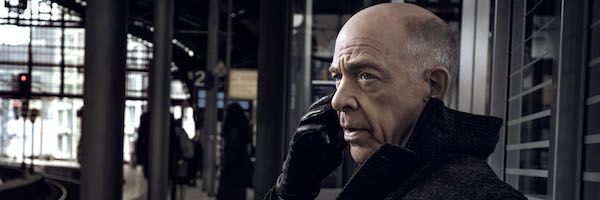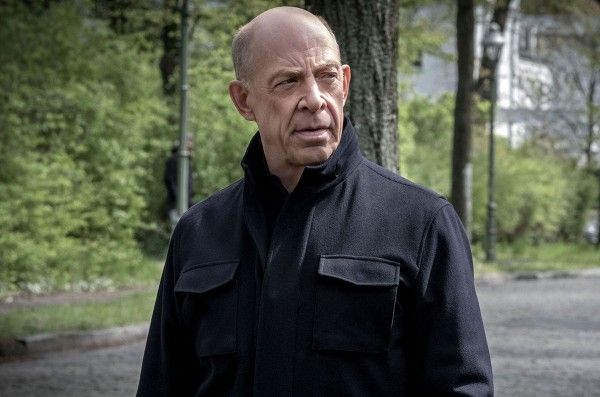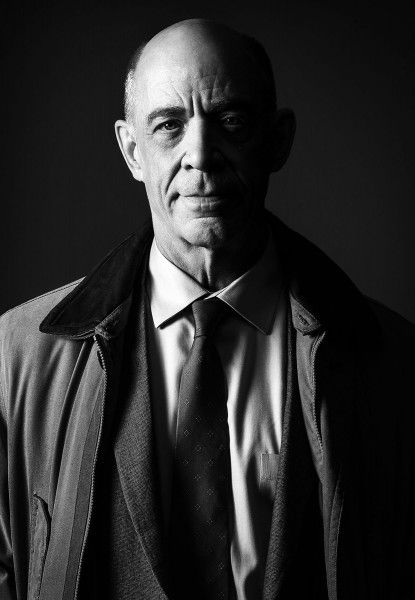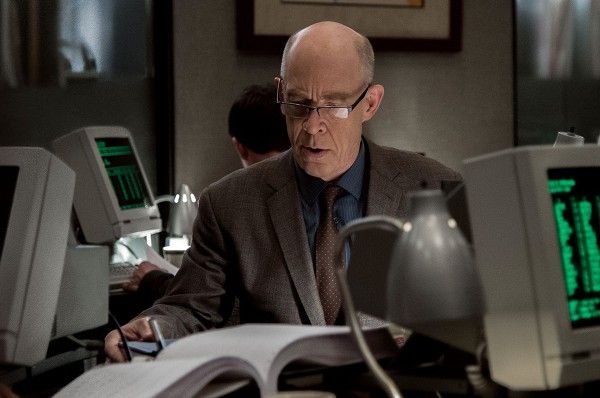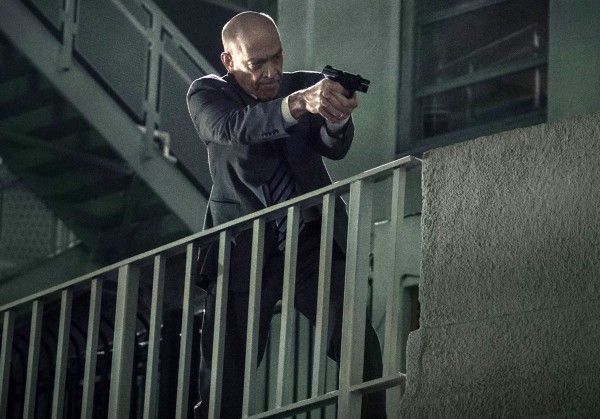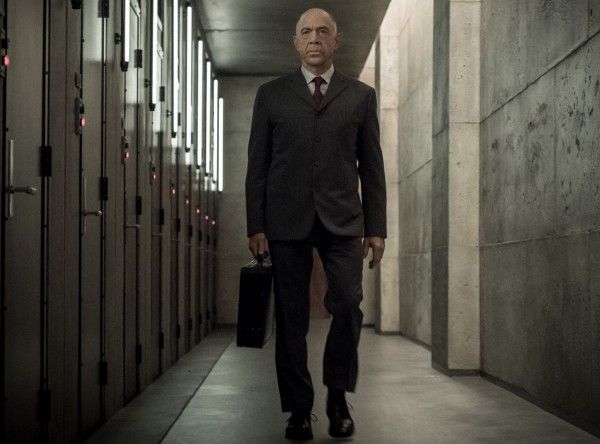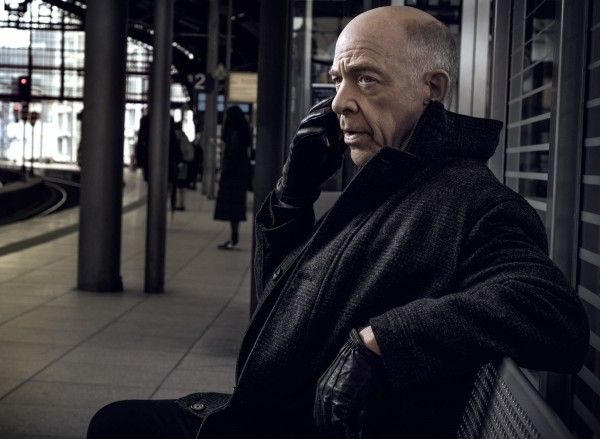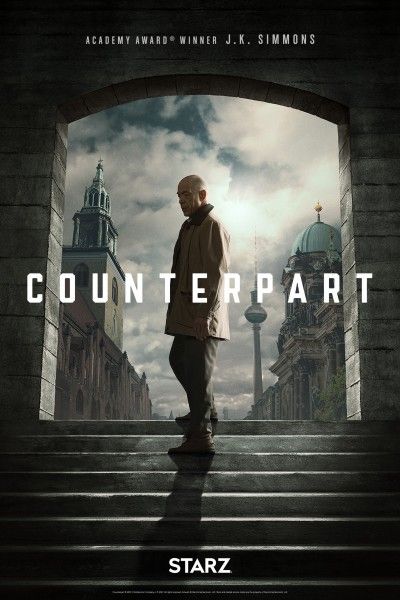On the Starz series Counterpart, Howard Silk (Academy Award winner J.K. Simmons) was just a lowly cog in the bureaucratic machinery of a Berlin-based United Nations spy agency, until learning that his organization safeguards the secret of a crossing into a parallel dimension that’s hidden from our everyday existence. The knowledge of this mysterious other world puts Howard right in the middle of danger, intrigue and espionage that he never could have imagined, and he finds himself having to work with his own near-identical counterpart while questioning everyone and everything he knows.
During this 1-on-1 interview with Collider, the terrifically talented J.K. Simmons, in one of the best performances of his career, talked about being glad that he ultimately decided to sign on for Counterpart, how working in TV now differs from when he’s done it in the past, the luxury of getting to read all of the scripts before they started shooting, the challenge of playing a dual role, how he views each Howard, and what the Howards admire in each other, even though they’d never admit it. He also talked about his experience on Justice League, his hope to get to explore Commissioner Gordon further, and what makes a project appealing to him.
Collider: When we last spoke, you hadn’t started shooting Counterpart yet, but you did say that you’d been reluctant about signing on, for a number of reasons. Now that you’ve shot a season, how do you feel about the decision to jump in?
J.K. SIMMONS: Great, almost unequivocally. We have the great luxury of knowing that we’re gonna do Season 2, so I’m looking forward to getting back at it.
Did the things you were hesitant about go away quickly, once you had started?
SIMMONS: Yeah, once they moved production to L.A. with a jaunt to Europe, that was the biggest one. The other concern about, am I the right guy for this part, for a variety of reasons, began to go away. By the time I was in front of a camera, being that guy, I was convinced that I could do it.
How does working in TV now differ from when you’ve worked in TV, in the past?
SIMMONS: It differs, fundamentally. Television, certainly, is evolving. There’s also a difference between premium cable, or high-end TV, and not being on the big networks, where you’re doing 22 episodes a year, or you’re doing a procedural or a sitcom or something that has a very regimented structure to it. There’s a lot more creative freedom at a place like Starz. When I did the first drama in the history of premium cable, with Oz, 20 years ago, Chris Albrecht was at HBO and basically gave Tom Fontana free rein to make whatever twisted, bizarre stuff he wanted to make. And here we are now, with Justin [Marks] having some creative freedom to do this show. That’s a big difference. It really feels like this kind of TV is a hybrid between television and features. We know that we’re making 20 hours of material, and we have to be making 40, 50 or 60. To have the luxury that we know we have more story to tell is great.
How much did you get to read, scripts wise, before signing on?
SIMMONS: All ten episodes were actually written, before we started shooting, because the schedule kept getting delayed, for one reason or another. It was my schedule sometimes, and then (director) Morten Tyldum’s schedule. That ended up being a real luxury for Justin, certainly. There were lots of rewrites, as there always are during the process, but that was nice, and I think that will be the case for Season 2. We’ll be going into [Season 2], looking at shooting a 10-hour feature and hopefully be able to do it even more in order than we ended up being able to do, the first season.
Were there any major story or character changes, or were there just small rewrites?
SIMMONS: Honestly, it got to be such a blur, but I don’t think there was anything gigantic. I don’t think there were any gigantic changes, once we started shooting. It was more little tweaks, here and there, with a subplot being eliminated or added. It was so tightly written. As usual, you end up looking at the finished product and seeing the edit, and the nature of the beast is that you shoot more than you’re gonna use. Especially with a feature, but less so with this, that’s where the movie gets made. All and all, it’s been a really coherent process, all the way from me reading Justin’s pilot script, two-plus years ago, into viewing the final versions of the first season.
What are you most excited about with Season 2?
SIMMONS: I’m not privy to all of where it’s going. And when we have conversations about where it’s going, I sometimes say, “Don’t tell me.” There’s stuff I don’t want to know. Backstory stuff, of course, is different. I’m looking forward to being surprised and getting the new episode script.
This show really takes character duality to a whole different level. It’s more than just having to play twins because you’re actually playing two versions of the same person. What are the challenges in that? Is it more challenging than you thought it would be?
SIMMONS: More challenging, technically, in some ways, than I thought it might be. It’s also more challenging, as an actor. It’s a lot to learn. Normally, as an actor, the way I work and same for the actors that I’ve really enjoyed working with, is that you listen. When you’re playing a scene, whether it’s four or five or six people, or it’s a two-man scene, you need to learn your dialogue, of course, but I have evolved to a place where I don’t like to spend a lot of time making choices ahead of time. I get the words, more or less, in my head, and then I just play with the other actor or actors. When the other actor is you, it takes away part of that process and forces me to go back, in a way, to my original experience and training in theater, and be more prepared and rehearse more, just for those scenes, specifically, where I’m playing two characters. The rest of the scene work, when I’m getting to play scenes with Olivia [Williams], Harry [Lloyd], Nicholas [Pinnock], Ulrich [Thomsen], Sara [Serraiocco] or whoever, it’s been a great cast to work with. It’s an international cast. I don’t think I named another American actor in that.
You’re work is so terrific on this show. It’s just so fascinating to watch the differences in the two Howards and the way that you’re playing each of them.
SIMMONS: Well, thank you! There were lots of other possible ways to differentiate the characters that I contemplated, and then discarded. It’s a fascinating opportunity, even though that wasn’t what originally drew me to the project. It’s been fun to have the opportunity to play two different versions of the same human being, and to try to find those, as subtlely and realistically as possible.
What do you most enjoy about each Howard?
SIMMONS: I think of the first Howard you meet as being the protagonist. That’s the way I read the first episode, and pretty much the whole season. I read it, at first, not even knowing there was going to be this whole parallel world or dimension to it. I was anticipating just a simple-ish story about this guy. The thing that I began to really enjoy about the second Howard that you meet – the script refers to him as Prime, but to me he’s Alpha because he’s the more Alpha version of Howard – is his sense of humor and the way he belittles and views most other people, and certainly his counterpart, as inferior. Some of that got lost in the edit, frankly, because he was very much that way towards Harry’s character, Ulrich’s character, his ex-wife, and pretty much everybody.
Do you think the Howards admire each other?
SIMMONS: I think neither of them would admit it. Some of the most stark differences, at their core, are things that they would actually say that they envy about the other, but only to themselves. The first Howard would envy the confidence and charisma and the ability to handle himself, of the second Howard. And the second Howard, as disdainful as he is of Howard, in general, would envy that the first Howard is just a loving, kind human being who looks for genuine connection with people that the second Howard has been trying to keep at arm’s length.
It was great to see you in Justice League, but we only just got a glimpse of you. Were you involved with any of those re-shoots? Did you work with both directors on that?
SIMMONS: I was not, no. I was barely involved in the movie, period. And then, that even got cut. I only worked with Zack [Snyder]. Because I don’t really pay attention to show business, outside of my own thing, I was unaware of most of that. I didn’t even know until somebody in the press told me about the re-shoots. And I have no idea what to expect, going forward.
Do you hope we’ll still get to see more, at some point?
SIMMONS: Oh, yeah! Assuming that we’re gonna go forward, the way we think it will, I’m really looking forward to that. Hopefully, it will be really fun and the character will expand a little bit, particularly in the stand-alone Batman movie. There will be more to do. I guess it’s Matt Reeves now for that one, who I haven’t met. So, it will be a whole new collaborator to get together and work with, hopefully.
At this point in your life, what makes a project appealing to you?
SIMMONS: A big part of it is the diversity of it. I look for something that’s different from whatever I’ve been doing recently, whether that means a different medium, a different style, a different period, a wacky comedy, or something darker. Our daughter is a junior in high school now, so I’m actually contemplating, a year and a half from now, going back onto the stage, as daunting as that prospect is, after being away for so long. I’m just looking for new challenges, honestly. I have a short attention span and I’m easily bored, so I’m looking for something new, all the time.
Counterpart airs on Sunday nights on Starz.

